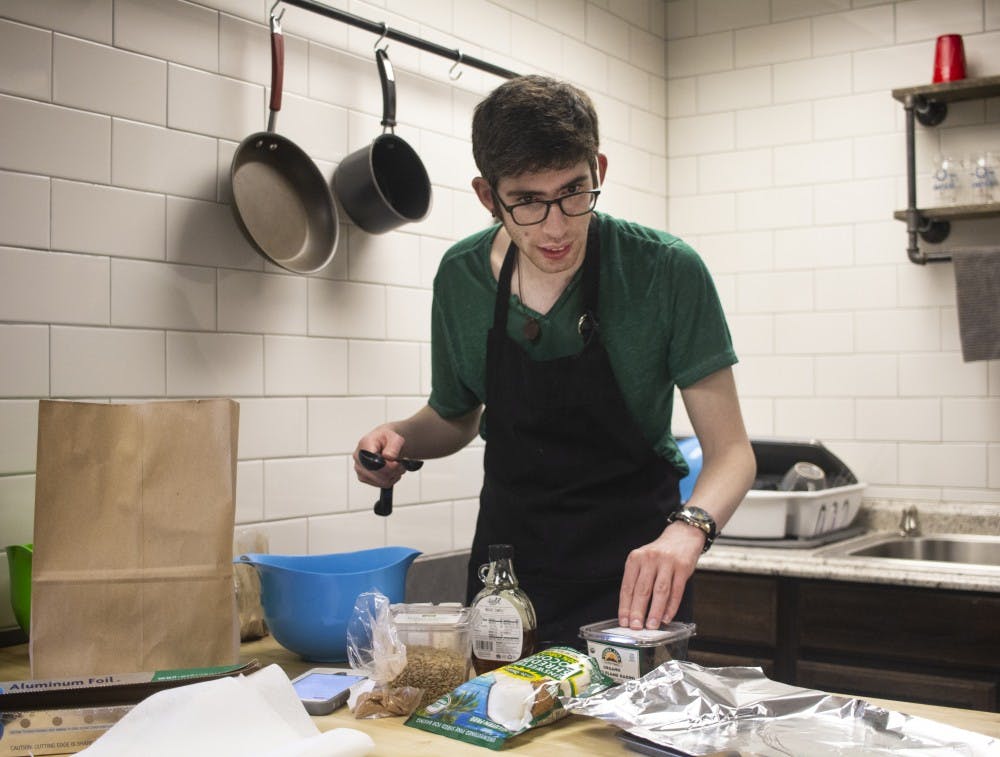Joe Banchik wasn’t supposed to have adventurous taste.
On a recent afternoon, he swayed side to side, stooped over a white cutting board and chopping basil. Although Banchik has cooked ostrich, he had never made minestrone.
“I like to open myself up,” he said.
The people he is cooking for aren’t nearly as daring. Banchik knows his creations will stretch their palates.
Banchik is 25 and on the autism spectrum. He moved from Long Island, New York eight years ago to join College Internship Program Bloomington, a center on North College Avenue to help young adults with autism, Asperger's, attention deficit hyperactivity disorder and other learning differences achieve independence.
He tests recipes in the center's kitchen, writes reviews and shares his final product with peers and staff.He brings leftovers to the front office of his apartment building.
“They’re huge fans of my cooking,” Banchik said.
People on the autism spectrum tend to be picky eaters, but Banchik's love for foods such as blowfish and guinea pig don’t match the stereotypes attached to him at birth. He has loved gourmet food since he was a child and read his mother's cookbooks for fun.
To try to increase the likelihood that his peers will try — and maybe even enjoy — his food, Banchik makes adjustments when he cooks. For the minestrone, he chose a mild Italian sausage because he wasn’t sure how much spice his audience could handle.
Once, he even persuaded some of his friends to eat kale.
Banchik doesn’t care about his peers liking his food as much as he wants to help them step out of their comfort zones, like he has. He wants them all to defy expectations.
Banchik likes to share that his high school teachers declared him unteachable and expected him to drop out at 16.
Most students find their way to CIP Bloomington after a setback, program director Jake Steinmetz said. Some come right from high school, but many have tried attending college or working on their own before realizing they need more assistance.
Banchik graduated high school and started at CIP Bloomington when he was 17.
CIP staff holds students accountable for schoolwork and jobs. Life skills coaches teach tasks like cooking, cleaning and budgeting. A therapist helps with day-to-day anxiety.
Initial interviews and consistent contact with family members help staff define each student's goals, which they break into manageable steps and assess at weekly staff meetings.
“We’re a safety net,” Steinmetz said of the program.
The Bloomington program is one of five such centers in the United States, and it draws students from across the country.
The program has a tiered system of support to gradually lead students toward self-sufficiency. At first a student might spend 20 hours a week working with staff, but as they progress, that could decrease to as few as five hours, Steinmetz said.
People in the program live alongside college students in Smallwood on College Apartments or, if they’re ready for more responsibility and less supervision, a “Graduate Living Community” on their own.
The students are required to attend a weekly get-together in the CIP building’s spacious annex. This typically involves video games. They must also participate in at least two social events on weekends.
The average stay is two to three years, Steinmetz said. Some families prefer their kids stay until they finish their degree, which can take much longer than a traditional four-year path.
Banchik has three semesters left at IU studying cinema and media psychology. He watches a lot of movies — his favorite is the "Die Hard" series — and he is considering using his degree to become a food or travel critic.
Teresa Colby has worked with Banchik since he arrived in Bloomington. She started as his tutor before becoming his job coach.
Banchik had a lot to learn.
He had to communicate with roommates at Smallwood on College Apartments. He had to navigate IU’s academic bureaucracy. He had to request accommodations and clarifications from professors.
“That transition to independent living on your own after high school is always hard,” Colby said.
To advocate for his needs, Banchik needed to learn to understand others’ perspectives.
Research has shown people on the autism spectrum struggle with cognitive empathy, meaning they have trouble imagining others' thoughts and feelings.
“That takes a certain finesse,” Colby said. “It will always be a struggle for Joe.”
He loves rare steak and can’t fathom how anyone could like it otherwise. One of his biggest achievements was using his specialty brown sugar wasabi marinade to convince his dad to eat rare to medium-rare steak.
Steaks and chops are Banchik’s specialities.
Banchik’s sense of adventure is not confined to his taste buds. He has taken advantage of almost every trip offered by the national CIP organization, traveling to Ecuador, Tokyo, Belize and more. He is often the only student from the Bloomington center to go on these trips.
CIP students follow either an academic or career track. Once their academic and work schedules are set, staff members build individualized programs for career coaching, academic advising, therapy, fitness and life skills.
Banchik currently receives about 10 hours of support each week, career coordinator Charles Culp said. Some students need daily wake-up calls and medicine checks. Banchik is past all that.
“He’s been in our program long enough that he knows what we expect of him,” Culp said.
Banchik has come a long way since he came to Bloomington. Now, his passion for cooking may be the strongest force propelling him toward an independent life.
Last summer, Banchik started posting recipe reviews on America’s Test Kitchen, a media company with TV shows, magazines, online recipes and books geared toward home cooks.
Fifteen reviews later, the technical language Banchik uses to describe food has improved, Culp said. So have his academic assignments.
He writes faster and more concisely now, Culp said. The staff doesn’t have to hover over him as he completes his work.
Banchik says having autism is part of what motivated him to become a serious cook. He mentions he has autism in his online reviews to show his palate is not one-dimensional.
For Banchik, the kitchen is a place to express himself.
“You’re allowed to be who you are,” he said.

His weekly test sessions have boosted his confidence in and out of the kitchen, Culp said.
He always adds a personal flair to professional recipes. Sometimes that means adjusting ingredients to make the recipe fresher. Other times, Banchik makes edits simply to be creative.
The minestrone called for dried cannellini beans, but Banchik could only find them in cans. Canned ingredients don’t cut it for him, so he swapped the beans for pasta.
“He’s learning to trust himself,” Culp said.
In the kitchen, Banchik makes decisions for himself, on his own terms. He saves just enough of the final product to review whether the dish turned out as planned. The rest he shares.
Sometimes things work, and sometimes they don’t. Culp said not all CIP students are willing to take this kind of risk.
“Some of our students are really afraid to step outside of that comfort zone,” Culp said. “Failure is scary.”
Writing about his passion is the key, Culp says. Banchik’s love for cooking, and his ability to engage it, is helping him grow.
In Brian Franklin’s nearly two years as a spokesperson for America’s Test Kitchen, many fans have emailed him asking for cookbooks.
When he received a note from Culp earlier this semester describing Banchik’s story, Franklin sent a company-wide email describing Joe, a “superfan,” and asked all the chefs to meet in the kitchen to sign a 1,030-page cookbook.
He’s never done something like this.
“It made everyone’s day,” Franklin said about Banchik’s story.
The chefs wrote notes like “Joe — cook smart,” “Cheers! Happy cooking," and “Cook on!”
At the program’s convocation May 2, CIP will present Banchik with this cookbook, a note from the chefs and a portfolio of recipes, photographs and reviews he and Culp assembled.
“He’s compiled his skillset and then expanded on it,” Culp said. “Not every student does that.”
Next year at this time, Banchik plans to receive another honor: his diploma.
He is currently enrolled in three classes and has three semesters left, including a summer term.
Banchik tracks his degree progress himself, which not all CIP students do.
Colby, who has worked with Banchik since he started the program, wants him to go back to New York to show his high school teachers he proved them wrong. He was even inducted into the Phi Theta Kappa honors society.
“You will slap them with your diploma,” Colby said to him, laughing.
“Yep,” Banchik replied. “I should bring my Phi Theta Kappa certificate.”
Staff often wander in to check on Banchik while he’s cooking, but he rarely needs help.
Banchik says the reviews were the hardest part of the test sessions, but he has developed a system. He rates the prep work, then the final product and notes any variations he made or skills he used. Sometimes he points out technical mistakes in the recipe.
In his review of the minestrone, Banchik ranked the prepwork a seven out of 10.
“While I loved getting to show off my knife skills, the other steps required constant attention and adjustments to make sure it came out right,” he wrote.
The final product was a hit among his peers.
“It was so delicious that they smelled it while it was cooking, like when you visit relatives and smell something good coming from their kitchen,” he wrote.
They kept asking him when it would be ready.
He gave the final product a perfect 10.




